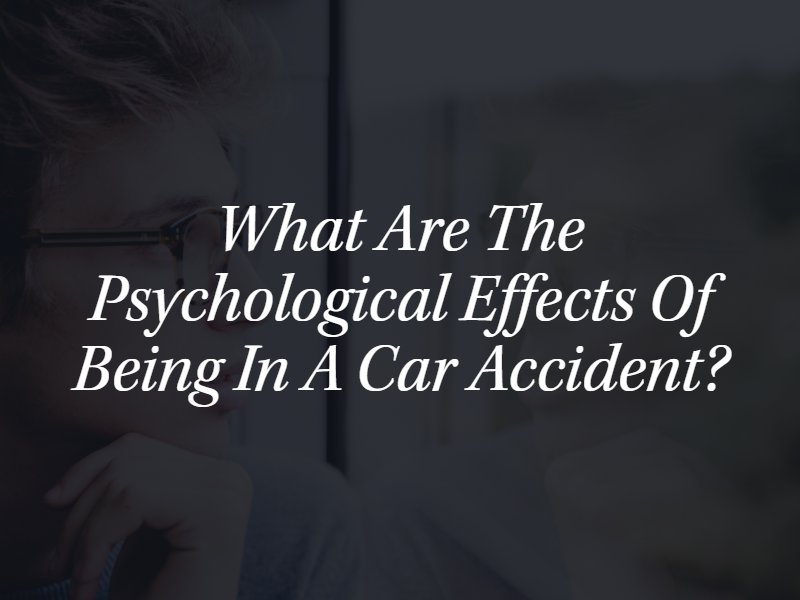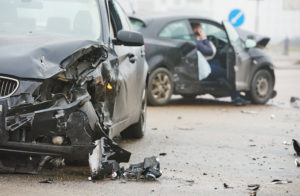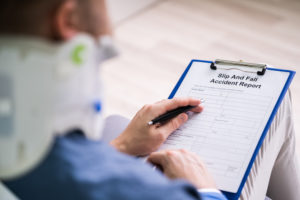What are the Psychological Effects of Being in A Car Accident?
An auto collision can have severe physical repercussions. If you are a survivor, you may be experiencing excruciating pain and suffering, along with financial hardship from medical bills. Physical injuries may be the primary consequences, but they are not the only ones that crash victims can face.
It is common for car accident survivors to also deal with psychological ramifications—stress, anxiety, and mental health conditions that can last for weeks or months after the crash. The psychological effects of a car accident can be just as damaging to a victim as physical injuries. Virginia allows survivors to file a claim for physical and emotional damages after a wreck.
IN THIS ARTICLE
- CAR ACCIDENTS AND POST-TRAUMATIC STRESS DISORDER
- INTENSE FEAR OR ANXIETY ABOUT DRIVING
- COMBAT PSYCHOLOGICAL ISSUES AND MAXIMIZE YOUR SETTLEMENT
- DEADLINE FOR CLAIMING PSYCHOLOGICAL DISTRESS IN A PERSONAL INJURY CLAIM
- PROVING PSYCHOLOGICAL EFFECTS IN A PERSONAL INJURY CASE
- COMPENSATION FOR PSYCHOLOGICAL DAMAGE FROM A CAR ACCIDENT
CAR ACCIDENTS CAN CAUSE POST-TRAUMATIC STRESS DISORDER
Motor vehicle accidents are the leading cause of civilian cases of post-traumatic stress disorder (PTSD) in the United States. Car collisions can be extremely traumatic and mentally damaging, leading to feelings of panic, anxiety, and stress that cause the victim to suffer long after the collision is over.
Post-traumatic stress disorder is a mental health condition that often develops after surviving a catastrophic event, such as an auto accident, sexual assault, or combat zone. A traumatic event, whether experienced or witnessed, may produce enough psychological damage to result in PTSD. Often, crash survivors with PTSD experience the following symptoms:
- Car accident flashbacks
- Nightmares about the crash
- Trouble sleeping
- Emotional distress reactions to reminders
- Detachment from loved ones
- Difficulty concentrating
- Startling easily
- Aggressive outbursts
- Mood swings
- Severe anxiety
- Depression
- Feelings of hopelessness
- Suicidal thoughts
PTSD following a vehicle accident is characterized by intrusive memories, avoidance, depressive mood swings, and altered physical and emotional responses. The likelihood of PTSD among survivors of serious auto accidents is higher than that of survivors of less severe incidents.
For instance, fatal collisions involving loved ones may cause long-term emotional harm. In order to receive treatment for post-traumatic stress disorder, a patient may need to visit a mental health specialist. Getting treatment as soon as possible can prevent the progression of PTSD symptoms.
For a Free Legal Consultation
Call The Personal Injury Lawyer Hotline.
804-250-5050
AUTO ACCIDENT VICTIMS EXPERIENCE INTENSE FEAR OR ANXIETY ABOUT DRIVING
Frequently, emotional reactions to auto accidents lead to a severe phobia of driving. Depending on the individual, this phobia may persist for weeks, months, or even longer. Just the prospect of getting into a car or behind the wheel might cause physical discomfort, intense anxiety, flashbacks, blackouts, nightmares, and psychological suffering.
Driving anxiety may make it difficult for the person to get to work, drive, and resume normal activities. Children with phobias may experience nightmares, bedwetting, regression, poor academic performance, and mood swings or outbursts.
Treatments for psychological and emotional harm resulting from an automobile accident may cost just as much, if not more, than treatments for genuine physical injuries. Auto accident victims with severe phobias may be eligible for associated compensation.
Let the Heavy Hitters® Take On Your Case 804-250-5050
COMBAT PSYCHOLOGICAL ISSUES AND MAXIMIZE YOUR SETTLEMENT
Finding a therapist who can assist you in healing is the first step on the road to mental health recovery. It is also a necessity to be able to recoup damages for emotional distress following a car accident.
Your recovery will be guided by a counselor, although it can take a while for your mental health to improve. You’ll receive guidance on how to manage the stress caused by the accident. Depending on how severe the symptoms are, medication may be advised. Your therapist will thoroughly document your progress and treatment plans to include in your settlement.
Going to a doctor to treat your physical body may be the best course of action because, often, the underlying physical injuries from the vehicle accident are what’s really harming your mental health.
Central Virginia's Top Rated Personal
Injury Lawyers 804-250-5050
DEADLINE FOR CLAIMING PSYCHOLOGICAL DISTRESS IN A PERSONAL INJURY CLAIM
If you believe that you may have a strong case for mental distress, it is crucial to see an attorney. Psychological distress from a car accident must be claimed before the statute of limitations runs out, just as physical injuries. These are determined by state legislation, and determining whether any unique circumstances apply might be challenging.
Consult a group of knowledgeable Virginia personal injury attorneys for professional legal analysis since missing a filing deadline could compromise your entitlement to compensation.
Let Us Be The Heavy Hitters® For Your Case Speak To An Attorney Now
PROVING PSYCHOLOGICAL EFFECTS IN A PERSONAL INJURY CASE
Mental and emotional effects caused by a personal injury are labeled as noneconomic damages and can be difficult to collect without adequate proof. Insurance providers and the civil courts will accept the following as proof that the car accident had a psychological impact on you:
THERAPIST FILES
Documentation from your treating professional may establish a psychological diagnosis and a connection to the accident if your emotional suffering is severe enough to require therapy or other long-term care.
MEDICAL DIAGNOSIS
Physical symptoms like weight loss, migraines, or ulcers that are diagnosed by a medical professional can be linked to mental anguish. There are other symptoms, such as high blood pressure and insomnia, that are also indicative of emotional distress.
EXPERT TESTIMONY
Sometimes it is necessary to hire an expert witness, like a psychologist, who can share their professional judgment in a report about your emotional response to the collision.
PERSONAL ACCOUNT
Your testimony at the deposition or trial can provide insightful information on how the crash affected your outlook. It’s encouraged to keep a journal, but keep in mind that this form of documentation is less persuasive without expert testimony.
WINNING COMPENSATION FOR PSYCHOLOGICAL DAMAGE FROM A CAR ACCIDENT
A severe auto accident can result in PTSD, crippling phobias, uncontrollable anxiety, and sadness. Studies have indicated that crash-related mental traumas, particularly in minors, might have symptoms that last for up to a year following a vehicle accident. A victim of a car accident who sustains psychological injuries may be entitled to financial compensation for these particular losses.
In an automobile accident lawsuit, Virginia provides for the recovery of noneconomic damages such as:
- Emotional distress
- Mental anguish
- Psychological damages
- Post-traumatic stress disorder
- Phobias of driving
- Anxiety
- Lost quality or enjoyment of life
- Loss of consortium
- Grief or bereavement
If you are a victim of PTSD or other psychological effects from an auto accident, you should seek professional help from a doctor right away. Hiring a car accident attorney will help you to pursue financial compensation for the intangible losses the crash caused. A lawyer may be able to obtain a fair recovery from an at-fault party for your psychological outcomes.
A lawyer may also be able to increase the amount of your settlement award to cover treatments and mental health care related to the psychological effects of a car accident. A crash victim may be able to regain their peace of mind and sense of optimism for the future by working with a mental health expert and an attorney.
The Pendleton Law Team Is Here For You 804-250-5050




